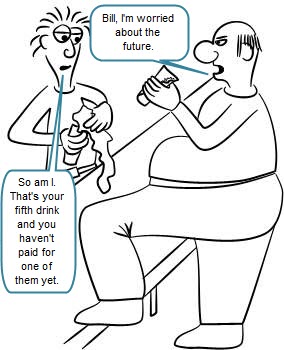5 Ways SEO Will Change in the Future

Trying to predict the future is a great deal like playing James Bond’s favorite casino game, baccarat – ultimately, you might guess correctly but then again, you could also lose your shirt and end up with nothing to show for your efforts. By the way, if you’re not familiar with baccarat, it’s basically a game where it’s almost pure chance and there is very little skill involved (unlike blackjack, which can be predicted by someone who knows math).
Anyway, while some of my predictions could end up being way off (Isaac Asimov famously predicted we’d have mile high skyscrapers and humanoid like robots by now), I believe that at least some of my predictions may come true (for example, Robert Heinlein predicted the World Wide Web back in the early 1980s in one of his last books, Friday).
My predictions are hopefully not going to be quite as fantastical as all that, but I do believe I have a good enough grasp of where SEO is going to be able to give you some guidance over the next year or two so that you can plan accordingly for the future.
It’s Going to Be Harder than Ever
This one should be obvious but too many fake SEO “experts” try to pretend that it’s not the case and they sell packages for a few dollars and claim it will solve all of your SEO problems. This is simply not the case.
Back when SEO first started, it was pretty easy – you stuffed your keyword meta tags with keywords you wanted to target and watched the traffic roll in. Then, Google came along and changed the whole game. They ignored the keywords and focused on what was actually written in your content. Of course, this lead to a host of different ways of gaming the system which today we know as “black hat SEO.”
However, even if you stick just to the so called “white hat SEO,” which by the way is not truly “white hat” (more on that in a moment), you could still run into problems because Google and the other search engines are simply not interested in seeing people trying to game the system, even if they build “legitimate” links back to their websites.
This is why I say that what we call “white hat” SEO is really more like “grey hat SEO.” In essence, when you do SEO, you are by definition trying to game the system and make your website appear higher in the search engine rankings. You may do this by building plenty of legitimate links back to your website, you may do this by putting up guest posts on lots of blogs and you may think that you are following a “white hat” SEO path but you’d be wrong.
Officially, all these things are still not what Google wants. Officially, they want only purely organic links. The point of looking at links was supposed to be that it counted as a “vote” for your website. The more prominent the site that linked to your website, the better the “vote” that you were getting from that link. By creating links, any kind of links, you are in essence “buying” a vote.
Mind you, Google and the other search engines understand this and tolerate it to a point. They know that people do this and as long as you do it in a way which doesn’t come across as being super spammy (i.e. building thousands of links on low quality “junk” sites), they tolerate it. However, at the same time, ideally, they’d love to eliminate this altogether.
That’s the idea behind the Penguin and Panda updates – the idea was that Google would try as much as possible to eliminate SEO efforts where you build links artificially, even if you do it in what has commonly come to be called a “white hat SEO” way.
That’s why I say that SEO is only going to get harder in the future – as long as you are trying to continue to “game” the system, you will have to find new and better ways to make your links appear as if they are natural and organic. Thus, SEO is becoming more and more of an art form and less and less something that just anyone can accomplish with a few clicks of a mouse.
Link Diversity Is Going to be More Important than Ever
Think about what I just mentioned above about SEO getting harder to do. Remember that ultimately, when you do SEO, your job is in essence to “game” the system in a way that doesn’t appear spammy. Okay, so how does one not appear “spammy” when they are gaming the system? Simple – they make their efforts look completely natural.
Now, think about link bait (i.e. articles or other content which naturally attract lots and lots of links from people because your stuff is interesting and something people want to actually tell their friends about). You’ll see links from all kinds of different websites. You’ll see links on blogs, news sites, wiki sites (where it’s appropriate to the subject matter), social media, web 2.0, and video sites. In other words, pretty much all over the web.
If you are determined to make your links look similar to those that naturally occur (i.e. organic links), then you are going to have to look for extreme link diversity. No longer should your efforts be focused exclusively on high PR do follow websites. Sure you need those too and they are still vitally important, however, those should not be the only place that your links appear.
By the same token however, there is one place where your links absolutely should not be appearing because those kinds of links are never naturally created – that’s on the spammy junk websites which exist solely to offer up additional links to various websites all over the web. Again, the point here is that you want your stuff to appear natural.
Now before anyone jumps on me about this, let me be clear that I’m not saying that SEO experts shouldn’t offer you packages of high PR links on quality websites. However, what I am saying is that going forward, if you want to continue to do SEO, you should be focusing on making your stuff appear as natural as possible and that means not completely ignoring PR0 and PRN/A websites.
Google and the Search Engines May Become Less Important
I know – it’s heresy for me as an SEO expert working for an SEO consultant to say this, but hear me out before you insist that I’m crazy. The fact is that Google and the other search engines have gotten an outsize importance in the world of “making it” online and that’s simply not the way things ought to be. I believe that things will change in the future in this regard, though SEO experts will still be needed.
The first thing I should say is that perhaps the term SEO expert will become somewhat outdated. Instead, perhaps we should be calling ourselves “online traffic experts.” In essence, as a website owner, if you didn’t appear at all in Google’s search listings but you were getting more business than you could possibly handle, would you really care?
In essence, as Google continues to tighten the screws, it may get to the point where trying to get to the top of the Google rankings through SEO efforts will be like trying to get a listing in the DMOZ directory, in other words, pretty well nigh impossible. However, that doesn’t mean you won’t need a consultant to help you to get the traffic you need. In fact, quite the opposite.
Remember that while millions of people do go to places like Google, Bing and Yahoo to find the website they want to look at, people also do look at hundreds of other websites (and no, I don’t just mean social media sites like Twitter and Facebook).
One person on the Warrior Forum whom I respect a great deal has mentioned on a number of occasions that she completely and utterly ignores Google and is still making money hand over fist. How does she do it? Through article marketing. No, not article directory marketing (i.e. spam the article directories in the hope that enough of your links will get through to raise your rankings). Article marketing.
In essence, article marketing means that you work to get really high quality content that you wrote syndicated onto popular websites and newsletters together with your backlinks in them. The idea is to write truly stellar articles (though video or other media such as infographics and video works too) and then offer them for free to other websites.
Check sometime on your favorite newspaper website and you’ll notice a number of articles come from places like Reuters or Agence-France-Press. These are wire services which provide articles which are already written and which these newspapers are free to republish unchanged.
In essence, by providing the same kind of high quality material, you can get your articles published in various well regarded magazines and newspapers online which will bring in all the traffic you can handle and without the need to worry about Google or Bing at all. Of course, making this happen will mean that you need an entirely new kind of consultant – kind of a post SEO consultant, but you will still need people like me and Yasir who spend all our time learning about these kinds of things.
Social Media with Become Both Less Important and More Important
Huh? I know – I sound like I’ve been drinking or doing drugs with the above statement. While I do enjoy a scotch or a glass of wine every now and again, I can assure you that I haven’t touched the stuff for several days now and am stone cold sober. I’m also quite proud just as an aside, to be able to say that I have never experimented with any kind of narcotics (well except for the prescription kind when I had shingles).
However, that said, the above statement is 100% accurate. These days, people are going crazy about social media and trying to find every which way to wring as many links as possible out of social media. The thing is, these kinds of links are not terribly difficult to get and the web is rife with offers to buy and sell links on “influential” Twitter and Facebook accounts for just a few dollars.
Because of this, I believe that such links will become less and less of a “vote” as far as Google and the other search engines are concerned. True influencers will of course continue to count for something (i.e. if Stephen Colbert tweets about you, then it’s worth something even for Google and the search engines), but the “influencers” you’ve never heard of will become less important.
On the other hand, I believe that social media is here to stay and will become important as a way to generate traffic. In essence, instead of being an indicator that your site is worth looking at on Google, I believe more and more links will come directly from social media and that you will see more and more direct traffic from these sources.
Again, the role of an SEO expert is changing from pure SEO to being more of an “online traffic expert.” This is just a part of it.
SEO Will Continue to Evolve
Finally, the best prediction of the future of SEO is that it’s unpredictable. Nobody knows for certain what will happen in the world of SEO going forward except that it will continue to be important. No matter how you slice it, the web is here to stay and competition for eyeballs will only get more and more fierce.
Thus, whether we are called search engine optimization experts or online traffic experts, we’ll continue to need to learn about changes in the online world and we’ll continue to have pay close attention if we want to continue to make money online, which is after all the ultimate goal that we all share.



